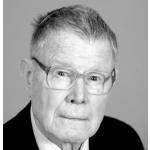Thomas C. Schelling

Thomas Schelling is a Distinguished Professor of Economics at the University of Maryland. In 2005, he was awarded the Nobel Prize in Economics for enhancing the "understanding of conflict and cooperation through game-theory analysis."
Schelling earned his PhD in economics in 1951 from Harvard University and then worked as an associate professor and full professor of economics at Yale University from 1953 until 1958. In 1956 he joined RAND as an adjunct fellow, becoming a full-time researcher for a year after leaving Yale, and returning to adjunct status through 2002. He was a professor of economics at Harvard until 1990 and is now a professor emeritus at the University of Maryland.
He has been elected to the National Academy of Sciences, the Institute of Medicine, and the American Academy of Arts and Sciences. In 1991 he was President of the American Economic Association, of which he is a Distinguished Fellow. Previous honors include the Frank E. Seidman Distinguished Award in Political Economy and the National Academy of Sciences award for Behavioral Research Relevant to the Prevention of Nuclear War.
He has published on military strategy and arms control, energy and environmental policy, climate change, nuclear proliferation, and terrorism. Other interests include organized crime, foreign aid and international trade, conflict and bargaining theory, racial segregation and integration, the military draft, health policy, tobacco and drugs policy, and ethical issues in public policy and in business. Schelling is best known for his books The Strategy of Conflict and Micromotives and Macrobehavior.
Schelling’s contributions in game theory have been used in many applied models, especially in the field of agent-based modeling. One of the earliest agent-based models in concept was Thomas Schelling's segregation model, which was discussed in his paper Dynamic Models of Segregation in 1971. Though Schelling originally used coins and graph paper rather than computers, his models embodied the basic concept of agent-based models as autonomous agents interacting in a shared environment with an observed aggregate, emergent outcome.
http://www.nobelprize.org/nobel_prizes/economics/laureates/2005/